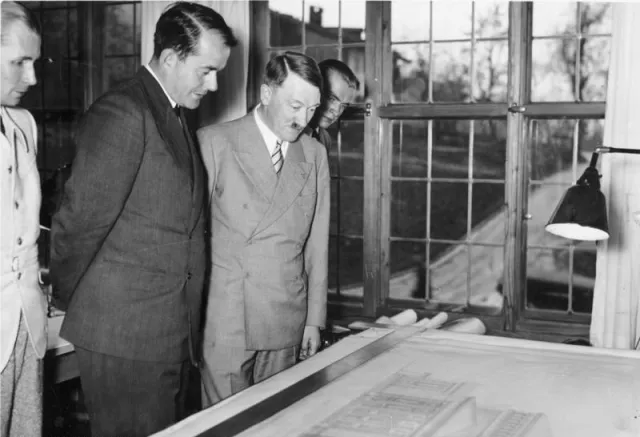HTT_10_5-15-14.mp3
(16.93 MB)
May 15, 2014
Carolyn Yeager and Ray Goodwin read and comment on the October 18-22, 1941 dinner table conversation and monologues by the German Leader, taken down in shorthand by trusted aide, attorney Heinrich Heim. Topics included in this episode:
- Britain's oligarchic, money-grubbing politicans don't represent the people;
- Germany needs to remain autarkic and independent from British imports even after the war;
- Need to improve standardization of construction and building products;
- Christianity and Bolshevism, and their relationship to St. Paul of Tarsus;
- Hitler identifies himself as "Prussian," compares Berlin favorably to Munich;
- Hitler: "I wish to be a builder." Monuments outlast the battles that inspired them.
The edition of Hitler's Table Talk being used was translated by Norman Cameron and R.H. Stevens, published by Enigma Books, New York, and can be found as a pdf here.
- 5413 views






I couldn't add anything to
Markus
I couldn't add anything to both of your commentary. Only that Japan and Italy fought a war of conquest instead of world view. Both rather went out to add little neighboring countries, instead of fighting world Jewry. Once the USSR would have fallen, it would have been easy to secure Italian and Japanese spheres of influence, just as it would be possible for Germany. Japan and Italy were reluctant in fighting total war and caused the Axis to break, including their own objectives to fail.
Hitler speaks of securing Holland's and Denmark's autarky. Very nice of him.
The Volkswagen (Beetle) was entirely built on standardization. The company was state owned and even the newly built city for the plant was built through standardization. All homes had little gardens, so that workers would own their own little empire. That was unheard of before for workers. (Mr. Tedor wrote a book about it and was also interviewed on radio recently).
Mannheim is known as Quadratestadt, square city. It's the first city that utilized the square city layout that is used everywhere in the US. So, this architect from there was the right guy to build efficient cities.
Levittown was Jewish
Burt
I don't mean this as a criticism, but I think it is important to observe that Levittown was a Jewish phenomenon. William Levitt was a Jewish developer. The musical "L'il Abner" epitomizes the Jewish mocking of White desires to have a good and normal society, and features a mocking approval of these developments. I can see the point that a certain amount of consistency would be helpful for homeowners, regarding window sizes and such, but I think the true White nature is expressed in having some diversity. I prefer the neighborhoods in which the houses vary somewhat. And consider Dresden and other old cities (pre-destruction), in which there was plenty of variety, and little tucked-in structures.
Wrong about Nantes
carolyn
I said in this program that I thought Nantes, where Col. Fritz Hotz was assassinated by terrorist Resistance members in 1941, was in the south of France - therefore not occupied by Germany.
I was wrong. Nantes is on the West coast and was occupied by German forces. According to Wikipedia, 48 civilians (no doubt suspected resistance members) were executed in reprisal for this assassination.
The citizens got off lightly considering that in 1943 the city was severely bombed twice by the Americans. It can sure be asked: Who did the most damage to the people of Nantes - the Americans or the Germans?
Mark Willey wrote that Japan
Repe
Mark Willey wrote that Japan had soon moved some troops towards the border of the Soviet Union when FDR immediately started forcing it to the war. Because this warmongering and threatening japan could not attack Russia. It had to attack USA and Britain. They forced Japan into the war. Because of the war in China, Japan could not fight with the Soviet Union.
Mark Willey's work is here:
carolyn
http://whatreallyhappened.com/WRHARTICLES/pearl/www.geocities.com/Penta…
It is often said that Japan
Markus
It is often said that Japan attacked the US for oil supplies. Japan could have gotten oil from Russia or only go into Dutch-Indonesia. The Netherlands were neutralized by Germany. Attacking the US was a mistake.
Japan told Hitler before
Repe
Japan told Hitler before Pearl Harbor that USA and Britain wanted war. The war was not a mistake. FDR would not have tolerated Japan's war with Stalin. In fact USA demandet that Japan should draw its army to Mandzhuria. The ultimatum to the japanese negotiators 29.11. and the ultimatum in the autumn were de facto declarings of war. Willey's book is quite revealing and the books from Walter Post too. USA and Britain very clearly said many times to japan that going into Dutch-Indonesia and Indochina would have meant war. They had also prohibited getting the oil completely.
faggots
Charles Traynor
I'm really pleased you got this show back up and running as quickly as you did Carolyn. As you might expect I am already an owner of this great book and have read it several times. It is good to know the real Adolf Hitler is at long last being made known to millions (okay thousands ;-)) of Americans who have until now been raised on a diet of poorly researched History Channel documentaries.
1. When the Führer referred to faggots on the night of 19th October 1941, he was not using modern American slang for homosexuals as suggested in the show. A faggot is a unit of measure for a bundle of sticks and is often used in relation to the witch burnings of the middle ages.
...the same old system of martyrs, tortures, faggots?
This sentence now makes sense to Americans I hope.
2. The name that slipped your memory just before the end of the show was Otto Wagener. His book, Hitler memoirs of a Confidant, (which you have mentioned now and again on other shows) is a must read for anyone interested in Adolf Hitler and National Socialism. Wagener in particular made me realise that true National Socialism would have taken generations to achieve if all had gone well.
Thanks for that info on faggots ...
carolyn
I hope you will comment on these shows regularly, Charles.